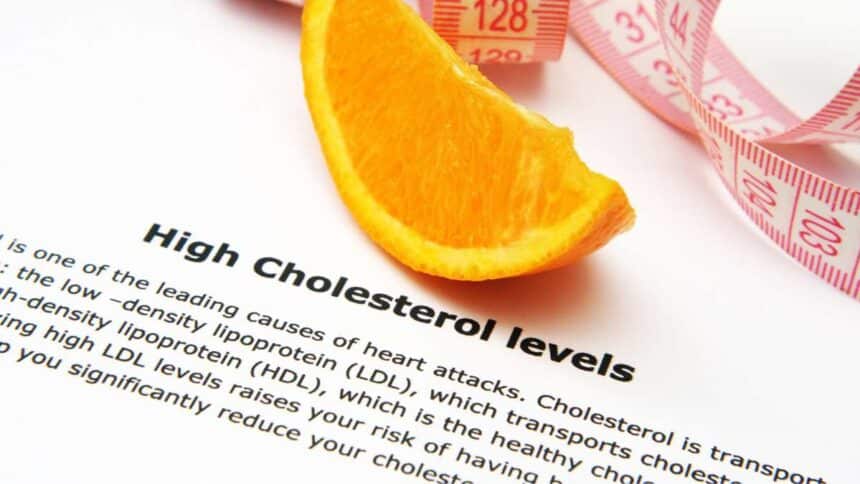You presumably care about your health and cholesterol’s impact on it if you’re reading this. That’s a crucial initial action. The high cholesterol levels that many people have today are not new. Cholesterol levels have been on the rise for quite some time. What has changed, however, is the way that we view cholesterol.
Until the late 1800s, cholesterol was considered a necessary part of the human body. It was thought to play a role in the development of the brain and the production of hormones. However, as we began to learn more about the body, we realised that cholesterol wasn’t the only thing that was important for health.
Today, we know that cholesterol isn’t the only thing that matters when it
comes to heart health. We also know that other factors can contribute to heart diseases, such as obesity and high blood pressure. However, it is still important to know your cholesterol levels.
High cholesterol levels can be a severe health concern. They can lead to an increased risk of coronary heart disease, stroke, and other medical problems. If left untreated, high cholesterol levels can cause serious health complications. For this reason, it is important to understand the causes, tests and treatments for high cholesterol levels. This expert guide provides information and tips to help you understand and manage your cholesterol levels to reduce your heart disease and stroke risk.
It covers topics such as the different types of cholesterol, the risks associated with high cholesterol levels, the different tests to determine your cholesterol levels, and lifestyle changes you can make to help lower your cholesterol. By following the advice in this guide, you can reduce your risk of stroke and heart disease and maintain healthy cholesterol levels.
What is Cholesterol?
Cholesterol is a waxy, fat-like substance produced in the liver and found in every cell of the body. Vitamin D synthesis, hormone synthesis, cell formation, and the production of bile acids, which help in food digestion, all require it. Your liver produces nearly 75% of the cholesterol your body needs; the remaining 25% comes from dairy and red meat.
For healthy cells to form, the human body requires cholesterol. It can raise the risk of heart disease when consumed in excess. When the body contains too much fat, it can lead to arterial blockage, heart disease, and other health issues. Anyone over 20 must thus have their cholesterol evaluated at least once every five years. You can also talk to your doctor about it, who can give you control over it.
Types of Cholesterol
LDL
LDL cholesterol can create fatty deposits called plaques on the artery walls, increasing your risk of developing heart disease. LDL cholesterol is referred described as “bad” cholesterol for this reason. The lower your LDL cholesterol level, the lesser your risk.
Your LDL is deemed to be extremely elevated if it’s 190 or more. In addition to recommending a statin, your doctor may also advise you to lead a healthy lifestyle. Statin drugs can lower cholesterol levels.
Even though your LDL level is less than 190, you could still require a statin. After calculating your 10-year risk, your doctor will propose a percentage by which you should strive to decrease your LDL level through diet, exercise, and, if required, medication.
HDL
It is accountable for eliminating “bad” cholesterol from circulation and avoiding its buildup in the arteries. Reduced risk of heart attack or stroke is associated with higher blood levels of HDL. A statin, like an exercise, can help raise your HDL levels modestly. Furthermore, healthy fats like olive oil may increase HDL cholesterol.
Triglycerides
Triglycerides, a kind of fat that circulates in the blood and is deposited in fat cells throughout the body, are produced by the body from excess calories, sugar, and alcohol. Triglyceride levels are often high in those who are overweight, sedentary, and smoke or drink heavily.
Triglycerides may make your arteries more brittle. Assume you have a triglyceride level of 150 or greater. You are more prone to acquire metabolic syndrome in this instance.
Due to this, there is an increased risk of strokes, heart problems, obesity, and increased blood pressure, among other heart-related conditions.
Total Cholesterol
LDL cholesterol, HDL cholesterol, and other lipid components are all included in total blood cholesterol. When establishing your risk for heart disease and the best treatment plan, your doctor will take into account the total cholesterol number.
What is High Cholesterol?
When you have too much cholesterol in your blood, you have high cholesterol, also known as hypercholesterolemia. According to the CDC, over 94 million Americans have high cholesterol.
Plaque, a fatty deposit, can develop on the artery walls if your cholesterol levels are high. The plaque can cut off oxygen delivery to the heart muscle and cause blood flow to cease. People may suffer shortness of breath or chest discomfort if blood and oxygen levels at heart decrease significantly.
A heart attack can also happen if plaque entirely stops the blood arteries that deliver oxygen and nutrients to the heart muscle. If the plaque obstructs a blood artery carrying blood to your brain, you might have a stroke. Diabetes patients frequently have elevated cholesterol.
Why Do People Get High Cholesterol?
Several things, according to studies, can influence cholesterol levels. Total cholesterol levels, for example, change with age. Gender may also be a factor. Factors that affect cholesterol levels include:
- Ancestral Lineage – Your family history has an impact on your cholesterol level as well. High cholesterol, for example, runs in families. If someone in your close family has it, you may as well.
- Poor Nutrition – Your liver produces cholesterol, but you can also receive it from the diet. Consuming too many meals heavy in saturated and trans fats can elevate cholesterol levels.
- Age – Even young toddlers can have high levels of bad cholesterol, but those over 40 years are far more likely to have it. Furthermore, your liver’s capacity to remove LDL cholesterol declines as you become older.
- Medication – Certain drugs, such as steroids, birth control, retinoids, and some blood pressure medications, such as diuretics, can cause a rise in cholesterol levels.
- Medical Situation – High cholesterol levels can lead to diabetes, peripheral artery disease, chronic renal disease, hyperlipidaemia, and HIV/AIDS.
- Obesity – Obesity and inactivity are other factors in elevated cholesterol. Obese adults typically have higher triglyceride levels.
- Exercise – Physical activity, such as following a regular exercise regimen, can boost HDL – good cholesterol!
- Cigarettes and Smoke – Smoking and tobacco use can also raise cholesterol levels. These may reduce HDL while increasing LDL.
Complications of High Cholesterol
High cholesterol levels can cause atherosclerosis, a disease in which cholesterol and other deposits develop on the artery walls. These fat deposits (plaques) might make it difficult for blood to pass through your arteries, resulting in the following issues.
- Chest pain or angina
- Heart attack
- High blood Pressure
- Chronic Renal Disease
- Peripheral Vascular Disease
- Stroke
- Bile Imbalance, which may result in gallstone
Cholesterol test
A comprehensive cholesterol test, also known as a lipid panel or lipid profile, is a blood test that determines the levels of cholesterol and triglycerides in your blood. A cholesterol test can help evaluate your risk of developing fatty deposits (plaques) in your arteries, which can result in congested or clogged arteries throughout your body (atherosclerosis).
A cholesterol test is a valuable tool. High cholesterol levels are frequently a major risk factor for coronary heart disease.
Why is it done?
Typically, high cholesterol produces no indications or symptoms. A complete cholesterol test is performed to evaluate if you have high cholesterol and to assess your risk of heart attacks, various types of heart disease, and blood vessel problems.
A comprehensive cholesterol test calculates four kinds of fats in your blood:
- Total cholesterol
- Low-density lipoprotein (LDL) cholesterol
- High-density lipoprotein (HDL) cholesterol
- Triglycerides
High Cholesterol Management
To reduce total cholesterol levels, heart-healthy lifestyles and medication therapy are the most common methods. Furthermore, the NIH provides care and preventative strategies for high cholesterol. They are as follows:
Avoid Trans fats
Consuming meals high in saturated and trans fats raise your blood cholesterol level. Limiting these items will help with blood cholesterol regulation and decrease while following a heart-healthy diet.
Lean meats, avocados, almonds, and low-fat dairy products are all part of a balanced diet. Additionally, you can eat meals high in omega-3 fatty acids.
Weight Control
You may reduce your cholesterol without having to lose a lot of weight. Even a ten-pound body weight decrease can reduce your LDL by up to 8% if you are overweight. Your HDL is also increasing. If you’re serious about reducing weight, you’ll have to stick with it. Losing one to two pounds each week is a healthy and doable goal.
Instead of “Butter,” use Olive Oil.
Olive oil can reduce LDL cholesterol by 15% when used as a butter alternative. Olive oil also includes heart-healthy “good” fats. As a result, choose extra virgin olive oil. These contain more antioxidants and are less processed.
Physical Exercise
Inactivity increases your risk of developing heart disease. LDL levels are reduced by exercise, and overall cholesterol levels are improved. You may start with basic things like going for a walk, signing up for a yoga class, riding your bike to work, or participating in sports. Exercise for 30 minutes is required.
Check Your Cholesterol Levels
Getting a cholesterol test can help you determine your risk of cardiovascular disease based on your blood’s fat and cholesterol levels.
According to the CDC, most healthy adults should have their cholesterol levels checked every four to six years. Those at higher risk for high cholesterol, or those with a family history of the disease, should be tested more frequently.
Conclusion
High cholesterol levels can have serious effects on your health. High cholesterol affects people of all ages, including those who exercise frequently and consider themselves to be healthy. In addition, several medical problems raise a person’s risk of heart disease and high cholesterol.
There are no early signs of elevated cholesterol. Only a quick blood test will reveal the answer. Nevertheless, you may be able to treat this illness and avoid complications by consulting your physician. Exercising regularly, eating a healthy diet, and quitting smoking are all important aspects of a healthy lifestyle.
Taking medication prescribed by your doctor may also help lower your cholesterol levels. Make sure to follow up with your doctor to monitor your cholesterol levels and make sure they are in a healthy range. With the right lifestyle choices, you can help keep your cholesterol levels in check and reduce your risk of developing serious health complications.
Socialbuzzness features articles on and about technology, business, lifestyle, and health. Socialbuzzness covers all kinds of news, including entertainment, technology, business, and finance.











